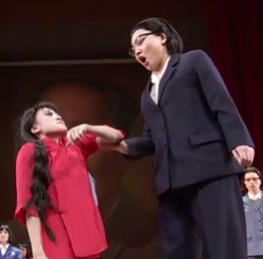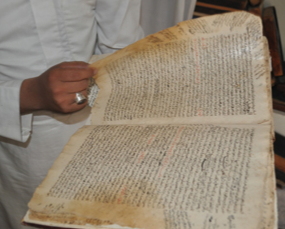 Next February marks the 40th anniversary of the historic meet-up between Chairman Mao and Richard Nixon. A series of events on the UO campus will commemorate the event and Eugene's Hult Center will host a performance of the surreal opera: Nixon in China.
Next February marks the 40th anniversary of the historic meet-up between Chairman Mao and Richard Nixon. A series of events on the UO campus will commemorate the event and Eugene's Hult Center will host a performance of the surreal opera: Nixon in China.
In 1972, Air Force One touched down on the tarmac in Beijing, China, and President Richard Nixon was soon famously photographed shaking hands with Chairman Mao Zedong, the authoritarian leader and founding father of the People’s Republic of China.

Nixon’s historic meeting with Mao, the inspiration for the surreal opera, Nixon in China, to be performed next March at the Hult Center in Eugene.
The moment is memorialized because it marked the first diplomatic acknowledgement of China by the United States since Mao took control of the country in 1949.
Communication between the leaders of the two countries had been so limited for so long that arrangements for the president’s visit were made via notes through intermediaries in Pakistan.
This February marks the fortieth anniversary of Nixon’s visit, and Bryna Goodman, professor of Chinese history, is taking the opportunity to highlight the historic occasion—as well as the whirlwind of change that has recently transformed China—through a series of events at the UO campus.
The centerpiece will be the opera by composer John Adams and librettist Alice Goodman, Nixon in China. A Peter Sellars production that originally premiered in 1987, the opera was recently revived across the U.S., including a New York Metropolitan Opera debut (watch excerpts). The Eugene Opera will stage it on March 16 and 18, 2012, at the Hult Center for the Performing Arts in Eugene.
Opera is well known for the telling of dramatic stories and legends from ancient history. Nixon in China, which focuses on contemporary history, deviates from fiction and myth, but not, said Goodman, from other signature operatic characteristics.
“The cast of characters associated with Nixon’s visit to China is as bizarre and outsized as anything in more traditional opera,” Goodman said. “Nixon was a grandiose personality—half tragic, half brilliant—and Mao was a revolutionary leader with an incredibly complicated personal and political life.”
The roles of political mastermind Henry Kissinger and Mao’s wife, the much-demonized Madame Mao, also add to the production’s surreal quality.
UO students will be able to take a special course in winter 2012—What Opera Can Do for History: Nixon in China in History and Onstage—thanks to funding from the Coleman-Guitteau Fellowship.
Other events during February and March include high-profile guest speakers such as Nicholas Platt, a member of the diplomatic entourage that accompanied Nixon on his diplomatic mission; veteran journalist Bernard Kalb, a member of the press corps covering the China mission; and impresario Peter Sellars himself.
The Jordan Schnitzer Museum of Art is also planning an exhibit, Forty Years of U.S.-China Relations and Nixon in China.
“The contrast between China under Mao and China now—it’s such a dramatic change. This is an opportunity to rethink and revisit that history,” said Goodman.
—Patricia Hickson




 Watch
Watch  Watch excerpts from the opera, coming soon to Eugene.
Watch excerpts from the opera, coming soon to Eugene. 

 Three’s a charm for a living memorial.
Three’s a charm for a living memorial.